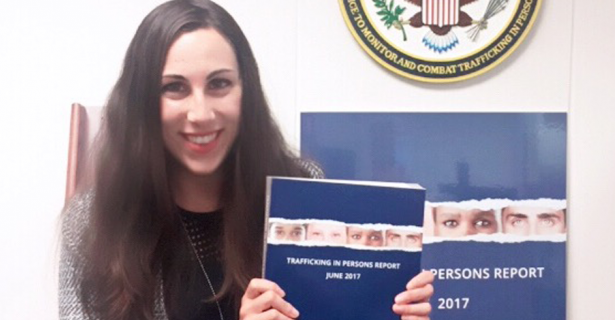This summer, I am serving as an intern for the U.S. Department of State’s Office to Monitor and Combat Trafficking in Persons, under the Bureau of Civilian Security, Democracy, and Human Rights. I primarily support the International Programs team, which develops regional programming strategies, monitors ongoing programs, and oversees grants selection. Both the Child Protection Compact and the potential award of the Program to End Modern Slavery are currently generating significant buzz in our office.
It’s been a true honor and a privilege to do work again in this field: two years ago, I interned at an anti-human trafficking NGO in Manila, Philippines. I alternated between working on their policy and advocacy team and spending time with victims of human trafficking (primarily online sexual exploitation of children victims) in a shelter. It ended up being the catalyst for my attending The Fletcher School of Law and Diplomacy and focusing on human security; my capstone project is also on issues surrounding human trafficking. That field experience also informed a want to better understand the role of national governments in leveraging strategic change to combat human trafficking: how can policies be negotiated and implemented between countries, especially when human trafficking is often integrated into shadow economies and criminal networks? Who are the primary government actors in combating human trafficking when it incorporates issues of national security, human rights, migration, and access to livelihoods, and how do these actors engage with non-state actors? How does this play out in the political arena?
While my days include activities that include supporting program staff, analyzing proposals, and participating in working groups, I find myself frequently revisiting these big questions. This was especially true a few weeks ago during the rollout of the Trafficking in Persons Report in late June; our office hosted eight heroes from around the world who were boundless inspirations and advocates for ending human trafficking and there was a large ceremony in an ornate room at the Department of State that featured speeches from Secretary of State Rex Tillerson and Advisor to the President Ivanka Trump. Given the state of politics these days, it’s almost too easy to make this ceremony political, but from an optics sense, it’s important to recognize the image of unity across party lines and also the ability of both parties to harness different motivations to tackle the same problem. My own thoughts on the issue aside, it was a powerful learning experience in understanding how to frame very political things in a non-partisan way -- a skill I’m finding to be imperative at State.
The TIP Rollout Ceremony also presents the opportunity for the Office to engage with practitioners and survivors directly. For example, I was able to participate in a small group discussion with Sister Vanaja Jasphine from Cameroon, who focuses her fight against human trafficking on increasing protections for migrant workers, particularly those who go to the Middle East. Within her narrative were threads of humility, grit, and a pragmatic determination to make a change. She spoke of her struggles in working with a government of limited capacity and of her want to better support victims throughout the prosecution process. She also remarked quite poignantly on a theme that I keep on bumping into during my time here: to really combat human trafficking, “we cannot heal the branches, we must treat the root.”
It’s a fascinating and challenging time to be here, and I am grateful to be in an office that is not only filled with intelligent, driven, and passionate people, but is also comforted by bipartisan support for its mission and programming. While our office is fairly new - it was established in 2000 in accordance with the Trafficking Victims Protection Act (TVPA) - it has been able to accord meaningful change to combat human trafficking, and to be a part of this organization has been and will remain incredibly influential. I look forward to seeing how the rest of the summer goes.
Disclaimer: The views presented here are of the perspective of the author, and are not affiliated with the Department of State.

